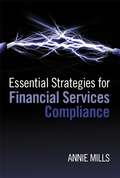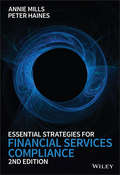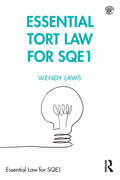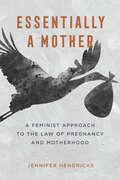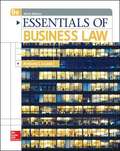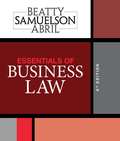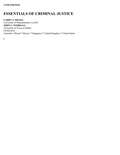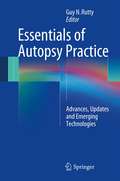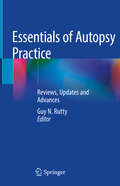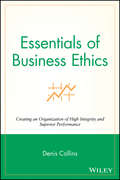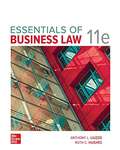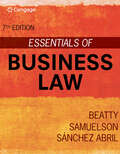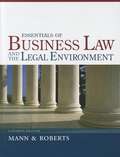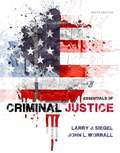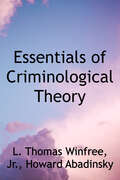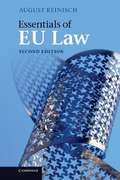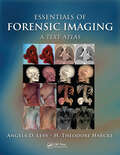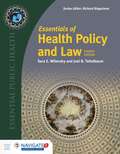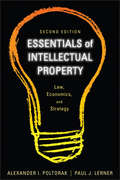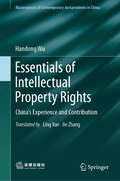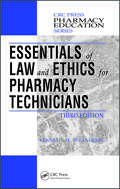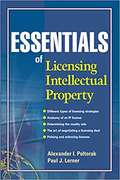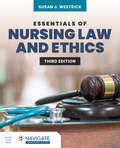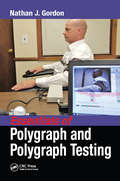- Table View
- List View
Essential Strategies for Financial Services Compliance
by Annie MillsCompliance officers perform a vital, yet unpopular role in the business world as they advise on complying with myriad rules and regulations. What is good for compliance is sometimes seen as being bad for business, making a compliance officer's role a difficult one. Essential Strategies for Financial Services Compliance offers practical guidance on how to apply a regulatory requirement to day to day situations. It also shows how to communicate the compliance department?s activities to the rest of the firm, how the role fits within the organization as a whole, what the scope and limitation of their responsibilities are, what to do when things go wrong, and how to deal with unusual problems.
Essential Strategies for Financial Services Compliance
by Annie Mills Peter HainesA fully updated edition of the definitive guide to financial regulation In recent years, not only has the compliance field become firmly established, but it has seen staggering growth, thanks to never-ending changes in the regulatory environment. As regulation increases still further, the demand for clear guidance on navigating daily compliance issues is greater than ever. Now in its second edition, the highly successful Essential Strategies for Financial Services Compliance has been updated with the latest compliance strategies and regulatory information, making it indispensable for compliance officers, legal firms, and anyone else working with the financial services compliance function. Non-compliance represents a significant material risk for any financial services firm that fails to understand and appropriately apply regulatory standards. This Second Edition of Essential Strategies for Financial Services Compliance makes it easy to digest complex information on the regulatory framework. But this book is far from solely theoretical. A balanced approach means that both the concepts and their application are within reach. Annie Mills and Peter Haines deliver solid advice that can be applied on a day-to-day basis to manage any compliance issues that may arise. Read this book to: Understand the conceptual basis of compliance and the current regulatory environment applicable to the financial services industry Quickly and thoroughly learn the accepted best practices for everyday compliance Get up to date information on the current financial regulatory environment with this new edition Reference detailed advice as issues arise in day-to-day operations This update to the popular first edition of Essential Strategies for Financial Services Compliance will help eliminate non-compliance risk and ensure that your firm is entirely current on its ability to navigate the maze of financial services regulation.
Essential Tort Law for SQE1 (Essential Law for SQE1)
by Wendy LawsEssential Tort Law for SQE1 explains the key principles of tort law in a clear, easy-to-follow style. Principles are introduced and illustrated with reference to practical examples. The book demonstrates the skill of client case analysis, taking a clear and structured approach to analysing the facts of a client’s case and then applying the relevant principles. It also includes a range of supportive features: Revision points: Each chapter concludes with a concise list of key revision points. Problem questions: To test understanding and analytical skills applied to practical scenarios. A companion website also provides suggested answers. Multiple choice questions: Each section of the book provides multiple choice questions following the SQE1 question format (with answers to enable you to test your knowledge). Further multiple choice questions and answers are also provided on the companion website. The first in a series of books aimed at those preparing for SQE1, this concise and accessible text provides a clear understanding of the tort element of SQE1 and enables you to test your assessment skills.
Essentially a Mother: A Feminist Approach to the Law of Pregnancy and Motherhood
by Jennifer HendricksEssentially a Mother argues that the law of pregnancy and motherhood has been overrun by sexist ideology. Courts have held that a pregnant woman’s nine months of gestation hardly count in her claim to parent the child she bears and that a man’s brief moment of ejaculation matters more than a woman’s labor. Armed with such dubious arguments, courts have stripped women of the right to abortion, treated surrogate mothers as mere vessels, and handed biological fathers—even those who became fathers through rape—automatic rights over women and their children. In this incisive and groundbreaking book, Jennifer Hendricks argues that feminists must overthrow the skewed value system that subordinates women, devalues caregiving, and denies too many the right to parent.
Essentials Of Business Law
by Anthony LiuzzoThe new, ninth edition of the Essentials of Business Law program is a practical, concise, and broad-based introduction to the vibrant field of business law. Both the traditional areas of law, such as contracts and property, and the emerging areas of law, such as e-commerce and environmental, are covered in short, informative chapters written to capture the essence of each topic. The objective of the text throughout its coverage is ease―ease of use, ease of teaching, ease of assessment, and ease of understanding. It has been developed for those seeking a more fundamental overview of the concepts and principles that are vital to the understanding of business law.
Essentials Of Business Law
by Jeffrey F. Beatty Susan S. Samuelson Patricia Sanchez AbrilPacked with current examples and real scenarios, ESSENTIALS OF BUSINESS LAW, 6th EDITION has earned praise from judges, attorneys, scholars, businesspeople, professors, and students. An extremely reader-friendly presentation features a conversational writing style that explains complex legal topics with easy-to-understand language. Using real-world stories, the authors illustrate how legal concepts apply to everyday business practice. As experienced teachers and respected scholars, the authors provide absolutely authoritative, thorough coverage of the issues most relevant to students today, while accurately foreseeing emerging legal trends and issues. Hands-on activities encourage students to think critically about legal issues and business. In addition, MindTap offers access to Case Collection with more than 1600 cases, sortable by name, year, state, and subject.
Essentials Of Criminal Justice (MindTap Course List Ser.)
by John L. Worrall Larry SiegelMaster the ins and outs of the criminal justice system with ESSENTIALS OF CRIMINAL JUSTICE! With coverage of topics such as criminal justice in the media, diversity issues in the justice system, and a comparison between the U.S. crime rate and international crime, this criminal justice text helps you better understand the basics of the criminal justice system. Class preparation is made easy with a book-specific website featuring concept builders, crossword puzzles, flashcards, internet exercises, tutorial quizzes, and much more! A full-size poster included with the text lets you to trace the flow of individuals through the criminal justice system to help you master the material.
Essentials of Autopsy Practice: Advances, Updates and Emerging Technologies
by Guy N. RuttyThis book covers new and exciting topics which have emerged in the area of autopsy recently, including the three different post-mortem CT-angiography systems currently available to practitioners in this field; a highly topical chapter on the role of genetic abnormalities in the handling of drugs within the body and how this can affect the interpretation of toxicological results in relation to how the drug may have caused or contributed to death; an update on the current classification and considerations related to deaths due to hanging; a review of injuries and fatalities caused by animals including post-mortem scavenging; an authoritative review of poisons and toxins from water and the life that inhabits it; and recent advances in knowledge in the use of entomology as an investigative tool as well as knowledge related to colonisation of cadavers by insects, animals and birds. Essentials of Autopsy Practice: Advances, Updates and Emerging Technologies is a multi-subject book, aimed at different grades of practitioners, from different practice areas, covering topics that are currently discussed and anticipated to be discussed in the field of autopsy practice over the next few years.
Essentials of Autopsy Practice: Reviews, Updates and Advances
by Guy N. RuttyThis book covers topical subjects within the field of death investigation, where changes in practice have recently occurred. The topics embrace the multi-disciplinary approach required for death investigation, and address advances in the field of forensic photography, pathology, and 3D printing as applied to forensics. This volume includes chapters on high altitude deaths, the role of 3D-printing applied to forensic investigations, photogrammetry, commotion cordis (an uncommon cause of fatal cardiac arrest) and the cricoid cartilage. Essentials of Autopsy Practice: Reviews, Updates and Advances is an educational and practical resource aimed at trainees and consultants, generalists and specialists, and multi-disciplinary teams.
Essentials of Business Ethics
by Denis CollinsThe essential guide to creating an organization ofhigh integrity and superior performance With the high-profile corporate scandals that have taken place in recent years, corporate ethics are more important to a business than ever before. The failure of ethical leadership in an organization is very destructive-it demoralizes the workforce, breeds public distrust, and ultimately results in organizational decay. Based on more than two decades of consulting, teaching, and research, Denis Collins's Essentials of Business Ethics is designed with appreciation for your demanding professional obligations, with easy-to-find, at-your-fingertips information. Its nuts-and-bolts presentation provides you with practical "how-to" examples and best practices on every area of managing ethics inside your organization in a handy, concise format. This brief yet powerful guide presents executives and leaders with timely discussion on: Human nature and unethical behavior in organizations Determining the ethics of job candidates The differences between a Code of Ethics and a Code of Conduct The best practices for managing diversity Using Management-by-Objectives to establish work goals that encourage ethical behavior Performance appraisals that reward ethical behaviors Aligning community outreach with the company's mission and assets Handling the environmental change process How to manage three internal communication mechanisms for employees to report potentially unethical or illegal behaviors: an Ethics & Compliance Office, Ombudsman, and Ethics Hotlines Providing a five-step ethics job-screen process and an ethical decision-making framework, as well as guidelines for conducting a variety of business ethics workshops, Essentials of Business Ethics is the only guide you will need containing all the relevant facts on business ethics, all in one place.
Essentials of Business Law
by Ruth Calhoun Hughes Anthony LiuzzoThe new, eleventh edition of the Essentials of Business Law program is a practical, concise, and broad-based introduction to the vibrant field of business law. <p><p>While continuing to offer all of the features that have made the ten prior editions successful, this new edition includes a chapter on the areas of law affected by social media, updated content, and enhanced support materials. Both the traditional areas of law, such as contracts and property, and the emerging areas of law, such as e-commerce and environmental, are covered in short, informative chapters written to capture the essence of each topic. The objective of the text throughout its coverage is ease of use, ease of teaching, ease of assessment, and ease of understanding. It has been developed for those seeking a more fundamental overview of the concepts and principles that are vital to the understanding of business law.
Essentials of Business Law
by Jeffrey F. Beatty Susan S. Samuelson Patricia Sánchez AbrilDiscover the business law text you'll actually enjoy reading. Time after time, students like you have commented that this is the best text they have ever read and they had no idea law could be so interesting. The student choice every time, Beatty/Samuelson/Abril's ESSENTIALS OF BUSINESS LAW, 7E is packed with current examples and real-life scenarios relevant to you -- from marijuana contracts to the impact of Covid-19 and #MeToo in the workplace. This reader-friendly book uses conversational writing to explain complex topics in easy-to-understand language. Because the authors actually practiced law before teaching, they are able to explain how law really works in everyday business practice. The authors have carefully selected topics sure to pique your interest. This edition emphasizes today's digital landscape with new information on privacy and intellectual property. An updated ethics chapter offers a practical approach, using the latest research to explain why people make unethical decisions. MindTap digital resources further reinforce learning with more than 1200 cases.
Essentials of Business Law and the Legal Environment
by Richard A. Mann Barry S. RobertsESSENTIALS OF BUSINESS LAW AND THE LEGAL ENVIRONMENT, 11TH EDITION helps you gain a complete understanding of today's business law and its environment with a straightforward, inviting, non-technical approach. Cases are carefully summarized and integrated throughout the book to present recent legal issues and significant landmark court decisions. You'll find coverage of today's most important legal subjects and ethical issues required for success on today's CPA exam.
Essentials of Criminal Justice, Ninth Edition
by Larry J. Siegel John L. WorrallIn Essentials of Criminal Justice, students will be challenged to think about ethical decisions and then presented with an opportunity to apply their own sense of ethics to everyday decision making in criminal justice. The book provides students with a thorough knowledge of the criminal justice system. It describes current methods of social control and analyzes their strengths and weaknesses. Part One of this book gives the student a basic introduction to crime, law, and justice and Part Two offers an overview of law enforcement.
Essentials of Criminological Theory
by Howard Abadinsky L. Thomas WinfreeThis concise textbook introduces students to multidisciplinary theories about why people commit crime. Winfree and Abadinsky strive to make the study of crime and justice as clear, concise, current, and consumable as possible. Tracing the evolution of theories and their influence on research today, the authors provide a solid foundation for students to understand the role theory plays in criminal justice practices. The first nine chapters explore various types of theories, providing the historical context and the basic assumptions each theory makes about human behavior, the causal arguments, and what criminologists have learned from testing the theories. The theory as originally proposed may have gone through a metamorphosis. Change is an important—and exciting—aspect of crime theory. Ideas that attempt to describe, explain, predict, and possibly control a specific behavior sometimes remain as originally conceived and sometimes evolve to something quite different. The final chapter explores the ways the various theories influence criminal justice policy, focusing on law enforcement.
Essentials of EU Law
by August ReinischStudents new to the study of EU law can find knowing what questions to ask to be as much of a challenge as answering them. This book clearly sets the scene: it explores the history and institutions of the EU, examines the interplay of its main bodies in its legislative process and illustrates the role played by the EU Courts and the importance of fundamental rights. The student is also introduced to the key principles of the internal market, in particular the free movement of goods and the free movement of workers. In addition a number of other EU policies, such as the Common Agricultural Policy, Environmental Protection and Social Policy are outlined, while a more detailed inquiry is made into European competition law. This book is an essential first port-of-call for all students of European law.
Essentials of Forensic Imaging: A Text-Atlas
by Angela D. Levy H. Theodore Harcke Jr.Bringing the long tradition of radiologic pathologic correlation to forensic radiology and autopsy, this volume provides readers with a technical and interpretive foundation for applying modern cross-sectional imaging to forensic autopsy. The book integrates more than 300 color images with basic forensic pathology in a topical format. The rich pictorial display of case material that accompanies the text establishes a contextual understanding of the material. Following an introduction to basic concepts and a review of imaging techniques, chapters are organized by cause of death. The atlas-like presentation is supported by full text explanations that review relevant forensic and radiologic principles.
Essentials of Health Policy and Law
by Joel Teitelbaum Sara WilenskyPublic opinion polls, media coverage, legal disputes, and policy debates at all levels of government and in private industry attest to the important place that individual health care and public health and safety hold in the minds of the American public, policymakers, and lawmakers. Essentials of Health Policy and Law, Fourth Edition provides students of public health, medicine, nursing, public policy, and health administration with an introduction to a broad range of seminal issues in U.S. health policy and law, analytic frameworks for studying these complex issues, and an understanding of the ways in which health policies and laws are formulated, implemented, and applied. Concise and straightforward, this text is particularly known for its focus on national health reform under the Affordable Care Act (ACA). Additionally, the Fourth Edition offers: <P><P>- A unique chapter on the social determinants of health and the role of law in improving health. - New content related to health reform; the healthcare system; the ACA's effect on Medicaid, Medicare, and CHIP; and incentivizing healthcare quality and private payer reform efforts. - A significantly revised chapter on Public Health Preparedness Policy, reflecting an increased focus on natural disasters, controlling infectious diseases, and military emergencies. - A how-to chapter on writing a policy analysis offers readers step-by-step instructions and examples for writing a policy brief. - Valuable instructor's resources, including PowerPoint slides, test questions for each chapter, blog post updates, and more.
Essentials of Immigration Law (3rd Edition)
by Richard A. BoswellThe author in this book tries to distill immigration law into its most essential elements and principles.
Essentials of Intellectual Property
by Alexander I. Poltorak Paul J. LernerThe definitive primer on intellectual property for business professionals, non-IP attorneys, entrepreneurs, and inventorsFull of valuable tips, techniques, illustrative real-world examples, exhibits, and best practices, the Second Edition of this handy and concise paperback will help you stay up to date on the newest thinking, strategies, developments, and case law in intellectual property.Presents fundamentals of patents, trademarks, copyrights, trade secrets and other less-know forms of IP, such as registered design and mask worksCovers important concepts such as IP strategy, protection, audits, valuation, management, and competitive intelligenceOffers an introduction to IP licensing and enforcementNow features discussion of critical precedent-setting recent IP cases and proposed patent reformProviding business professionals and IP owners with in-depth knowledge of this extremely important subject, this book helps those new to this field gain a better understanding and appreciation for the results of their creative abilities.
Essentials of Intellectual Property Rights: China’s Experience and Contribution (Masterpieces of Contemporary Jurisprudents in China)
by Handong WuWhile undertaking economic, social and judicial transformations unprecedented both in speed and scope, China is finding its ways to establish an IPRs’ regime with its own characteristics. Could China maintain its distinctive IPRs regime while honoring the international IPRs conventions? Have rights of IP holders been duly protected in China? How would China further enhance its IPRs legislation and enforcement in the near future? Handong Wu, China’s leading IPRs scholar, offers his insights from a nongovernmental perspective in hopes of providing readers, both general and academic, a vivid reflection of the IPRs system in China.
Essentials of Law and Ethics for Pharmacy Technicians (Pharmacy Education Series)
by Kenneth M. StrandbergAs the practice of modern medicine becomes more and more pharmacology dependent, the role of pharmacy technicians is becoming more complex. This is true in terms of the medications they are required to deliver, as well as the legal responsibilities and ethical considerations that come with administering those medicines. Essentials of Law and Ethics
Essentials of Licensing Intellectual Property
by Alexander I. Poltorak Paul J. LernerFull of valuable tips, techniques, illustrative real-world examples, exhibits, and best practices, this handy and concise paperback will help you stay up to date on the newest thinking, strategies, developments, and technologies in licensing intellectual property.
Essentials of Nursing Law and Ethics
by Susan J. WestrickEssentials of Nursing Law and Ethics continues its focus on the legal aspects of Nursing as it relates to patient safety and quality, environmental health and safety, error reduction and ethical boundaries of practice in an updated third edition. Written by a nurse attorney, this unique text presents complex topics to undergraduate nursing students in an understandable manner while providing accurate and well researched content relevant to nursing practice. The Third Edition was thoughtfully revised and updated to incorporate gender neutral, inclusive, patient-centered and person-first language throughout. Furthermore, it features new and updated case law examples and updated coverage of timely topics, including documentation, patient teaching, confidentiality, end of life issues, advance directives, refusing a patient assignment, sexual harassment in the workplace, use of social media by nurses, error reduction/disclosure, correctional nursing, age discrimination, the ADA, and more.
Essentials of Polygraph and Polygraph Testing
by Nathan J. GordonThroughout history, there has been an intrinsic need for humans to detect deception in other humans. Developed in 1923, the polygraph machine was a tool designed to do just this. To date, there have been many improvements made to the basic polygraph instrument. This book outlines the instrumentation as well as the latest in questioning techniques and methods available to the professional interviewer to determine truth from deception. The book covers psychology and physiology, a history of polygraph with the advances of leading figures, question formulation, data analysis, legal implications and legal cases, and the author’s developed technique Integrated Zone Comparison Technique (IZCT).
